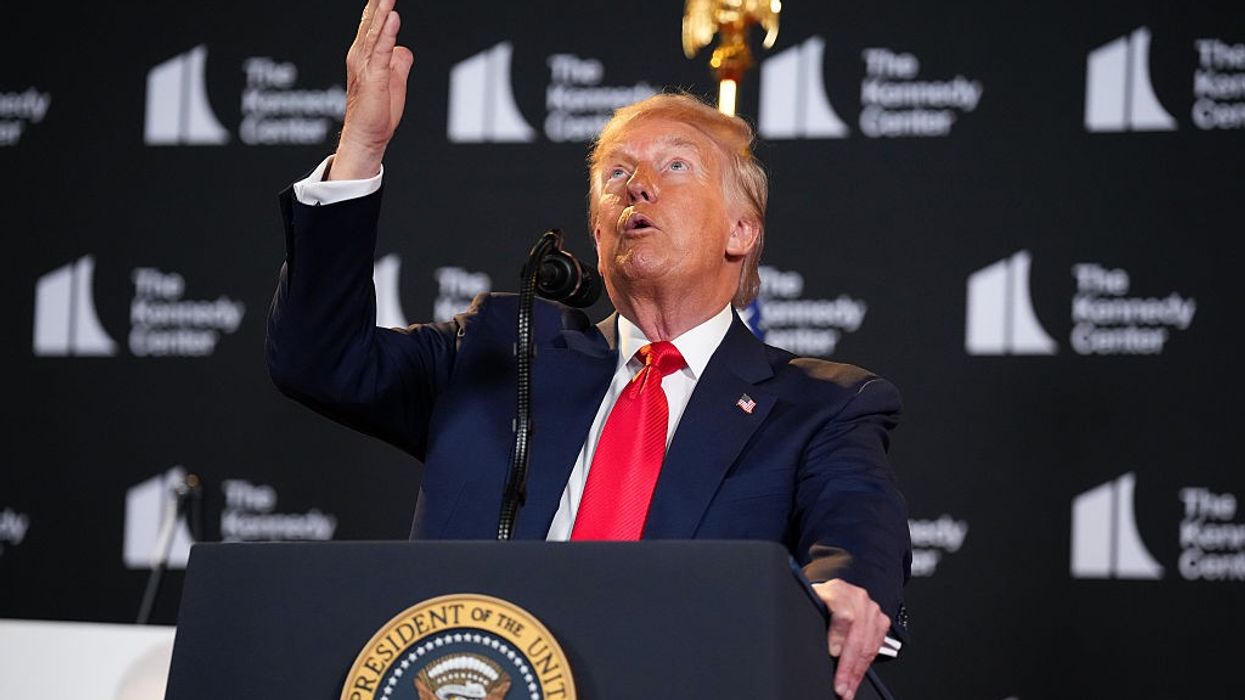But corrupting and stealing elections was just their first effort, starting back in the 1960s, the one that brought them to power. Now, with that power, they’re doing their best to gut the basic guardrails of our 250-year-old constitutional system with brand-new Big Lies.
The newest Big Lie for 2025 is that America is racked by “radical left violence” leading to the disintegration of law and order in our cities and the spread of terror among politicians and anybody else who dares speak out about the issues of our day.
Republican Big Lies have caused enormous damage, from FDR’s era through Joe McCarthy’s witch hunts to George W. Bush lying us into two illegal and unnecessary wars to today.
They’re using this to censor speech, ban comedians and commentators, prosecute people (including lifelong Republicans like Comey, Krebs, and Taylor) who’ve spoken out against Trump, violently attack protesters, and to justify the monopolization of our media by right-wing billionaires.
Most recently, when a Trump-supporting (Trump sign in his yard, Trump “Make Liberals Cry Again” T-shirt) straight, white, self-proclaimed Christian who thought Mormons were the anti-Christ murdered worshipers in a Latter Day Saints church in Michigan, Trump’s first response was to claim it was “anti-Christian violence.”
Instead, it appears this former Marine war vet with PTSD thought he was defending Christianity. But instead of asking if he was “radicalized” by preachers like Trump’s guy “Pastor” Robert Jeffress (who goes on and on about how the LDS Church is a “false religion”) or the algorithms on YouTube, Facebook, or X, right-wing media is today filled with rants about “attacks on Christianity,” blaming “the left” even for this attack.
It echo’s the GOP’s efforts to portray the two people who tried to assassinate Trump, Charlie Kirk’s killer, the Immigration and Customs Enforcement (ICE) shooter last week, and other political violence as originating from the “radical left.”
Which is really and truly another Big Lie.
First, there’s basically no “radical left” in America anymore. The anti-capitalist pro-violence subset of Students for a Democratic Society (SDS) that I knew back in the 1960s when I was part of Michigan State University’s SDS are long gone and well discredited (and a few imprisoned).
Second, the “far left” folks who are still around aren’t violent, by and large. Lefties are more interested in protecting Social Security, getting a national healthcare system into place, raising taxes on the morbidly rich, and getting guns off the streets instead of pointing them at people. The last high-profile “leftie” shooter was the mentally ill guy who took a shot at Republican Congressman Steve Scalise back in 2017.
Even the FBI and the Department of Justice themselves had acknowledged the fact that the vast majority of politically-inspired violence in America was coming from the right, at least until puppy-killer Kristi Noem or one of her lickspittles (or her boyfriend) ordered the reports removed from the government websites.
The independent and nonpartisan Center for Strategic and International Studies analyzed 893 terrorist plots that took place between 1994 and 2020. Their report concluded:
Right-wing attacks and plots account for the majority of all terrorist incidents in the United States since 1994.
But don’t expect to hear that from anybody in the administration or on Fox “News” or other right-wing media outlets. Instead, they’re using “far left violence” as their excuse to dismantle our rights, impose soldiers on cities run by Democrats, and pour your tax dollars into extreme policing and militarization of our society.
This isn’t the first time the GOP has used the Big Lie technique to sway public opinion in a way that demonizes Democrats. On September 23, 1944 President Franklin D. Roosevelt addressed the Teamsters and said:
“he opposition in this year has already imported into this campaign a very interesting thing, because it is foreign. They have imported the propaganda technique invented by the dictators abroad.
Remember, a number of years ago, there was a book, Mein Kampf, written by Hitler himself. The technique was all set out in Hitler’s book—and it was copied by the aggressors of Italy and Japan.
According to that technique, you should never use a small falsehood; always a big one, for its very fantastic nature would make it more credible, if only you keep repeating it over and over and over again.
He then did what Democrats—and what honest news media we have left—need to be doing today: He called out their lies and exposed their technique:
Well, let us take some simple illustrations that come to mind. For example, although I rubbed my eyes when I read it, we have been told that it was not a Republican depression, but a Democratic depression from which this Nation was saved in 1933.
That this Administration—this one today—is responsible for all the suffering and misery that the history books and the American people have always thought had been brought about during the twelve ill-fated years when the Republican party was in power.
He followed that with a list of four other Republican lies, including their assertion that he’d tried to get America into WWII, that he was secretly planning to prevent GIs from leaving the service when the war was over, and even a lie about his dog (Fala, after which his speech was named in the press). He summed it up:
Well, I think we all recognize the old technique. The people of this country know the past too well to be deceived into forgetting. Too much is at stake to forget.
They’re still doing it. Which raises the question: What will be Trump’s and the GOP’s next Big Lie?
They’ve already tried convincing Americans that:
- Immigrants are a major source of crime (when crime rates regarding immigrants are about half that of natural born Americans);
- Democrats are the party of rapists and pedophiles (ahem…Trump’s “best friend” Jeffrey Epstein, E Jean Carroll);
- Democrats want to defund the police (when they’re fighting for more cops in virtually every city in America);
- Are in favor of abortion “after birth”;
- That former President Joe Biden wanted to ban gas stoves and gasoline cars;
- Biden wanted to “ban meat";
- Democrats plan on huge tax increases on the middle class;
- "Antifa” (“Anti-Fascist”) is a domestic terrorist organization;
- Democrats are “deranged pieces of shit"; and
- Liberals want to “force taxpayers to fund transgender surgeries for minors’ nationwide” and, yesterday, Trump said Democrats want to “reopen the wall.“
This after promoting the Big Lie that got three police officers killed and 140 hospitalized on January 6 about the 2020 election was “stolen” and their Big Lie about immigrants voting that resulted in over 4 million citizens being denied their right to vote last year.
Republican Big Lies have caused enormous damage, from FDR’s era through Joe McCarthy’s witch hunts to George W. Bush lying us into two illegal and unnecessary wars to today.
It’s way past time that Democrats and the media start calling these Big Lies exactly what they are, and pointing out that the strategy originated in the modern era with Joseph Goebbels and Adolf Hitler.
Enough is enough.




